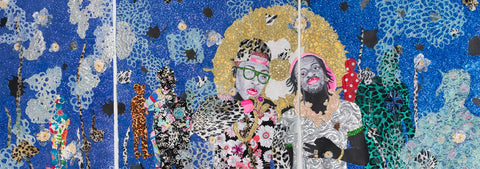Responses to Jamaican Pulse

We've been getting some wonderful feedback to our Jamaican Pulse exhibition from contributors, artists and gallery visitors over the last few weeks. Here are just a few.
UK-based artist Hurvin Anderson, whose work 'Beaded Curtain' appears in Jamaican Pulse, says: "I am glad to participate in such a full and diverse survey of Jamaican art. The exhibition looks at varying practices from traditional folk art to contemporary treatments and in doing so not only examines the history of art in Jamaica but the history of a country, it's changing culture and politics. It is important to me that these artists from Jamaica and the varying cultural outlooks they demonstrate are exhibited here in the UK and it is interesting to be part of a dialogue with them."
Eddie Chambers, from the Department of Art and Art History, University of Texas at Austin, says: "Jamaican Pulse is an incredibly important exhibition, showcasing as it does work from the earliest periods of modern art in Jamaica, right through to work by an exciting generation of present-day practitioners. Furthermore, the exhibition demonstrates a fascinating interplay between art that has been produced within Jamaica itself, and work that has been made by artists practicing in what we now commonly refer to as the diaspora. It has been several decades since such a curatorial dialogue was fashioned, and Jamaican Pulse offers audiences an invaluable opportunity to be reminded of, or to be introduced to, the intriguing origins of art in Jamaica, which then weaves a fascinating path up to present-day practices.
The work of artists practicing in the early 20th century revolved around such themes as visualising of the self, notions of community, representations of national progress, and so on. The work of more recent practitioners continues to reflect aspects of such themes, but very much within the context of a country with a dynamic culture of music, and a somewhat boisterous approach to social and political commentary. Many of the island’s practitioners have established themselves as important artists in other parts of the world, such as the US, and here in Britain. In that regard, the international dimensions of Jamaican Pulse are of huge importance, making this an exhibition that it as global as it is historical.
With Jamaica being primarily framed, in the wider world, through such things as holidays, reggae, and Rastarfari, this important exhibition offers us a unique opportunity to perhaps appreciate other aspects of life within (as well as the lives of Jamaicans beyond) the largest of the region’s English speaking countries. The exhibition exists as important validation for the art and artists of a country with the most dramatic of histories."
Eddie has also written a piece called 'Jamaican Art Goes Outernational' which is featured in the accompanying Jamaican Pulse book.
We've also had some fantastic feedback from visitors over the course of the show, including:
"A very comprehensive exhibition, mixed media and strong messages, even more potent today."
"Really enjoyed the exhibition. Lots to think and talk about. Varied and something for everyone. Great! More! More!"
"I love this exhibition. I will be thinking about it and feeling it for a long time. I'll investigate these artists."
"Excellent exhibition – an honest discussion as regards real issues instead of the vague and abstract notions of most contemporary art."
"A wonderful gift here in Bristol. Fantastic exhibition. Thank you."
"Brilliant show – refreshing – exceptionally stimulating. Thank you for providing deep thinking and stimulation let alone about Jamaican but about how we responded to that island and its people."
"As an artist: totally inspiring and uplifting to experience on a rainy afternoon in Bristol
As a Diasporic African: feelings of rage and sadness, for the continued impact of the Transatlantic Slave Trade
As a Spiritual Warrior: loving the courage and beauty in humanity."
"It was like paradise" – Daniel, aged 7
Jamaican Pulse ends on 11 September.